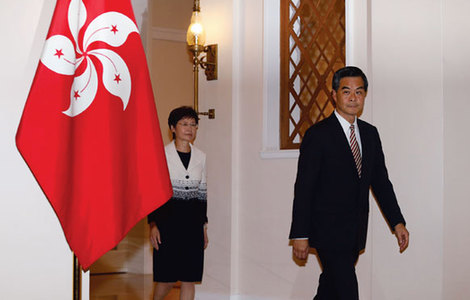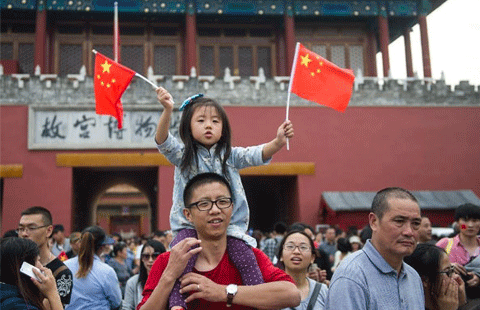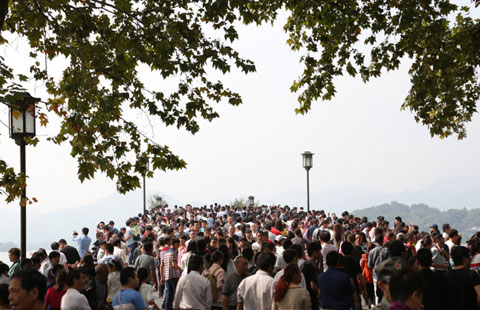Handover 'brought democracy to HK'
Updated: 2014-10-04 07:00
By ZHANG CHUNYAN(China Daily)
|
||||||||
A renowned British academic said Beijing has overwhelmingly honored its commitment to the principle of "One Country, Two Systems" since the Hong Kong handover in 1997 and that most protesters in the former British colony are driven by a sense of dislocation.
Martin Jacques made the comments in an article headlined "China is HK's future-not its enemy" that appeared in British newspaper The Guardian on Tuesday.
Jacques is best known for his best-selling book When China Rules the World: the End of the Western World and the Birth of a New Global Order. He is also a columnist for The Guardian and New Statesman.
In the article, he said it should be remembered that for 155 years until it returned to China. Hong Kong never enjoyed a semblance of democracy under the British. The city's 28 governors were appointed by the British government.
"The idea of any kind of democracy was first introduced by the Chinese government," he wrote, adding that in 1990 the latter adopted the Basic Law, which included the commitment that in 2017 Hong Kong's chief executive would be elected by universal suffrage. Beijing also spelt out that the nomination of candidates would be a matter for a nominating committee.
"This proposal should be seen in the context of what was a highly innovative-and, to Westerners, completely unfamiliar-constitutional approach by the Chinese," he wrote in the article, adding that the Chinese meant what they offered.
Jacques lived in Hong Kong for three years from 1998.
The article also said that Hong Kong's relationship with the mainland has been changing rapidly. "Herein lies a fundamental reason for the present unrest-the growing sense of dislocation among a section of Hong Kong's population."
During the 20 years or so before the handover, Hong Kong enjoyed its golden era-not because of the British but because of the mainlanders, Jacques wrote.
He said he believes that Hong Kong is the beneficiary of Beijing's reform and opening-up policy-it became the entry point to the mainland, and as a result attracted multinational companies and banks that wanted to gain access to the mainland market.
Hong Kong has gradually lost its role as the gateway to the mainland, he writes. Previously, the city was an unrivalled financial center, "now it is increasingly dwarfed by Shanghai. Until recently, Hong Kong was by far China's largest port-now it has been surpassed by Shanghai and Shenzhen, and Guangzhou will shortly overtake it.
"Many Hong Kong locals are struggling to come to terms with these new realities. They are experiencing a sense of displacement. They know their future is inextricably bound up with the mainland but that is very different from embracing the fact," he writes.
"There is no alternative-the Chinese mainland is the future of Hong Kong," Jacques concluded.

 HK urges end to 'Occupy' protests
HK urges end to 'Occupy' protests
 Young Chinese footballers learn from the best in Brazil
Young Chinese footballers learn from the best in Brazil
 Autumn fairy tales in China
Autumn fairy tales in China
 Scenic spots in Beijing packed with tourists
Scenic spots in Beijing packed with tourists
 Fruit and vegetable carnival fascinates tourists in Shanghai
Fruit and vegetable carnival fascinates tourists in Shanghai
 Elders celebrate Chongyang Festival across China
Elders celebrate Chongyang Festival across China
 China, US voice commitment to ties
China, US voice commitment to ties
 Golden Week brings tourism peak
Golden Week brings tourism peak
Most Viewed
Editor's Picks

|

|

|

|

|

|
Today's Top News
Firmly safeguard rule of law in HK
Hong Kong chief calls for peace after clashes
Overseas experts laud Xi's remarks
US visas hinder talent search: expert
US lifting ban on lethal arms sales to Vietnam
US job market improves remarkably as economy expands
'One Country, Two Systems' vital
Sharapova to meet Ivanovic at China Open semis
US Weekly

|

|







